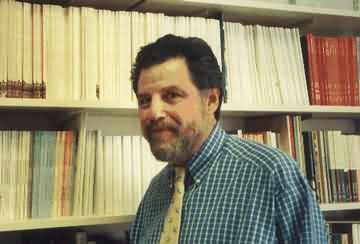 My name is Huck Gutman, and I am interested in poetry. I teach at
the University of Vermont, and am so fascinated by what poems can do, so
entranced by them, that I would like to share my fascination with others.
I've developed web pages on which I talk about some of the poets who fascinate
me the most, hoping to enable those of you who visit to find an entrance,
a broad and sunlit path, into the works of a number of this century's finest
poets. [Baudelaire wrote in the nineteenth century,
but he is a major fore-runner to the poets who followed him.]
My name is Huck Gutman, and I am interested in poetry. I teach at
the University of Vermont, and am so fascinated by what poems can do, so
entranced by them, that I would like to share my fascination with others.
I've developed web pages on which I talk about some of the poets who fascinate
me the most, hoping to enable those of you who visit to find an entrance,
a broad and sunlit path, into the works of a number of this century's finest
poets. [Baudelaire wrote in the nineteenth century,
but he is a major fore-runner to the poets who followed him.]
Listed below are the names of major poets of our century, with a few extraordinary precursor poets from the nineteenth century added as well.
This page has many images, and loads slowly. If you want the page without the images, click on Modern Poetry Without Images. [All linked web pages will still have images!]
This list is continually under
construction: if you visit in the future, there will be more names, more
wonderful poetry to encounter.
<If you want to know more about Huck Gutman, visit my Home Page >
Poets of Our Age
Anna
Akhmatova
 Anna Akhmatova was one of the great lyric poets of the twentieth century.
Born in Russia, she lived through the tumultuous events of that country's
history: the fall of the Tsarist government and the Russian Revolution,
the internecine struggles of the reolutionary period, the establishment
of the Soviet Union, the iron fist of Stalinism, World War II, the Cold
War, and the slow thawing of despotic power. Originally a lyric poet
of love and her homeland, she was at times brutalized into not writing
because of her popularity -- a threat to the regime -- and her independence.
During the Stalin years she composed what may be our century's greatest
poem, a remarkable lyric sequence called "Requiem." In it,
she witnesses to and commemorates the suffering of those who endured the
awful terror of imprisonment in the vast prison camp system known as the
Gulag: "I stand as witness to the common lot,/ survivor of that time,
that place." To
explore the poetry of Anna Akhmatova, and encounter one of the supreme
accomplishments of twentieth century writing, click on this photograph
of the young Akhmatova.
Anna Akhmatova was one of the great lyric poets of the twentieth century.
Born in Russia, she lived through the tumultuous events of that country's
history: the fall of the Tsarist government and the Russian Revolution,
the internecine struggles of the reolutionary period, the establishment
of the Soviet Union, the iron fist of Stalinism, World War II, the Cold
War, and the slow thawing of despotic power. Originally a lyric poet
of love and her homeland, she was at times brutalized into not writing
because of her popularity -- a threat to the regime -- and her independence.
During the Stalin years she composed what may be our century's greatest
poem, a remarkable lyric sequence called "Requiem." In it,
she witnesses to and commemorates the suffering of those who endured the
awful terror of imprisonment in the vast prison camp system known as the
Gulag: "I stand as witness to the common lot,/ survivor of that time,
that place." To
explore the poetry of Anna Akhmatova, and encounter one of the supreme
accomplishments of twentieth century writing, click on this photograph
of the young Akhmatova.
Yehuda
Amichai
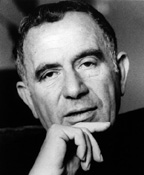 Born
in Germany, Yehuda Amichai emigrated to Israel when he was twelve.
One of the great love poets of modern times, his poems are at once humorous
and filled with grief. It is one of Amichai's richest accomplishments
that he, by writing in the modern Hebrew spoken on the streets and in the
shops and homes of Israel, helped created a vernacular literature for the
new nation. Owing in large measure to his example, vernacular Hebrew
has become the literary language of Israel, instead of the language of
the Bible. In Amichai one almost always encounters a delight in figurative
language; yet his poems are never pretentious or tedious, since they speak
out of the everyday and towards concerns we encounter every day.To
explore the poetry of Yehuda Amichai, click on this photograph of him.
Born
in Germany, Yehuda Amichai emigrated to Israel when he was twelve.
One of the great love poets of modern times, his poems are at once humorous
and filled with grief. It is one of Amichai's richest accomplishments
that he, by writing in the modern Hebrew spoken on the streets and in the
shops and homes of Israel, helped created a vernacular literature for the
new nation. Owing in large measure to his example, vernacular Hebrew
has become the literary language of Israel, instead of the language of
the Bible. In Amichai one almost always encounters a delight in figurative
language; yet his poems are never pretentious or tedious, since they speak
out of the everyday and towards concerns we encounter every day.To
explore the poetry of Yehuda Amichai, click on this photograph of him.
Elizabeth
Bishop
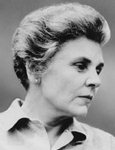 Elizabeth Bishop, an American poet, wrote poetry from the 1940's
through the 70's. We can seem increasingly, how central her role
was: a link between the modernist experimentation of the first half of
the twentieth century, and the interest in closely observing the self of
more recent times. Though she did not write as many poems as many
of her contemporaries, her best and the most influential poems are among
the most important work of the second half of the twentieth century.
They draw the reader into a world of close observation and wonderfully
rich vision. To
explore the poetry of Elizabeth Bishop, click on this photograph of her.
Elizabeth Bishop, an American poet, wrote poetry from the 1940's
through the 70's. We can seem increasingly, how central her role
was: a link between the modernist experimentation of the first half of
the twentieth century, and the interest in closely observing the self of
more recent times. Though she did not write as many poems as many
of her contemporaries, her best and the most influential poems are among
the most important work of the second half of the twentieth century.
They draw the reader into a world of close observation and wonderfully
rich vision. To
explore the poetry of Elizabeth Bishop, click on this photograph of her.
Charles
Baudelaire
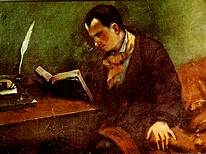 Charles Baudelaire stunned and shocked France when he published his Les
Fleurs du Mal ("Flowers of Evil") in 1855. In many ways,
the image we have of the modern artist -- a bohemian, living an economically
tenuous existence, exploring what the French call the 'demi-monde' (a world
of alcohol, drugs, sexual experimentation), pushing at not only the boundaries
of art but the boundaries of public taste, shocking those who encounter
his work -- was created from the material of Baudelaire's life. But
it is primarily for his poetry, not his life, that he is celebrated: first
encounter the modern city in Baudelaire's poetry, and the obsessions of
modern life (despair, excess, boredom, the search for meaning) shape his
poetic concerns. To explore the
poetry of Charles Baudelaire, click on this painting of him by Gustave
Courbet.
Charles Baudelaire stunned and shocked France when he published his Les
Fleurs du Mal ("Flowers of Evil") in 1855. In many ways,
the image we have of the modern artist -- a bohemian, living an economically
tenuous existence, exploring what the French call the 'demi-monde' (a world
of alcohol, drugs, sexual experimentation), pushing at not only the boundaries
of art but the boundaries of public taste, shocking those who encounter
his work -- was created from the material of Baudelaire's life. But
it is primarily for his poetry, not his life, that he is celebrated: first
encounter the modern city in Baudelaire's poetry, and the obsessions of
modern life (despair, excess, boredom, the search for meaning) shape his
poetic concerns. To explore the
poetry of Charles Baudelaire, click on this painting of him by Gustave
Courbet.
Constantin P. Cavafy
 The great Greek poet Constantin Cavafy lived,for almost all his life in
Alexandria, Egypt. His poetry is the poetry of exile. Some
of his poems deal with historical subjects, primarily with those Greeks
who, after the fall of Alexander, lived in colonies or countries beyond
the boundaries of Greece itself. Other poems deal with a kind of
psychological exile: with the fact of being homosexual in a society which
categorized gay men as 'deviant.' To Cavafy, however, there is no
deviance to homosexuality: only passion, beauty, loss, pain. In exploring
sexual themes, he investigates the human condition, and writes poems that
are deeply moving and at the same time readily accessible. William
Butler Yeats wrote, "We have no enemy but time," and certainly time is
one of Cavafy's great concerns. But in his poetry, time is not only
loss, it is the medium which allows memory to function, and so is the progenitor
of art. One recalls Cavafy, as well, as one of the progenitors of
the use of vernacular language in twentieth century poetry. To
explore the poetry of Constantin Cavafy, click on this photograph of him.
The great Greek poet Constantin Cavafy lived,for almost all his life in
Alexandria, Egypt. His poetry is the poetry of exile. Some
of his poems deal with historical subjects, primarily with those Greeks
who, after the fall of Alexander, lived in colonies or countries beyond
the boundaries of Greece itself. Other poems deal with a kind of
psychological exile: with the fact of being homosexual in a society which
categorized gay men as 'deviant.' To Cavafy, however, there is no
deviance to homosexuality: only passion, beauty, loss, pain. In exploring
sexual themes, he investigates the human condition, and writes poems that
are deeply moving and at the same time readily accessible. William
Butler Yeats wrote, "We have no enemy but time," and certainly time is
one of Cavafy's great concerns. But in his poetry, time is not only
loss, it is the medium which allows memory to function, and so is the progenitor
of art. One recalls Cavafy, as well, as one of the progenitors of
the use of vernacular language in twentieth century poetry. To
explore the poetry of Constantin Cavafy, click on this photograph of him.
T. S. Eliot
 Thomas
Stearns Eliot was born in St. Louis and educated in the United States,
but once he went to Britain to do graduate work in philosophy he remained
in that country for the rest of his adult life. During the first
half of the twentieth century he was widely regarded -- both in the English-speaking
world, but also beyond -- as the most important and influential poet of
the modern era. As time has passed, his stature remains great, but
there is recognition that other poets -- among them Rilke, Apollinaire,
Williams, Stevens, Lorca, Myakovsky, Neruda -- have been equally influential.
His work is notoriously difficult, a situation which he may in part have
created to obscure how deeply personal and revealing were the subjects
of his poetic work. Despite the fact that his 1922 The Waste Land
is generally regarded as the single most important poem of the twentieth
century, it is possible that his early work "The Love Song of J. Alfred
Prufrock" is his most compelling poem.
To explore the poetry of T.S. Eliot and in particular the dramatic
lyric "The Love Song of J. Alfred Prufrock" click on this photograph of
him.
Thomas
Stearns Eliot was born in St. Louis and educated in the United States,
but once he went to Britain to do graduate work in philosophy he remained
in that country for the rest of his adult life. During the first
half of the twentieth century he was widely regarded -- both in the English-speaking
world, but also beyond -- as the most important and influential poet of
the modern era. As time has passed, his stature remains great, but
there is recognition that other poets -- among them Rilke, Apollinaire,
Williams, Stevens, Lorca, Myakovsky, Neruda -- have been equally influential.
His work is notoriously difficult, a situation which he may in part have
created to obscure how deeply personal and revealing were the subjects
of his poetic work. Despite the fact that his 1922 The Waste Land
is generally regarded as the single most important poem of the twentieth
century, it is possible that his early work "The Love Song of J. Alfred
Prufrock" is his most compelling poem.
To explore the poetry of T.S. Eliot and in particular the dramatic
lyric "The Love Song of J. Alfred Prufrock" click on this photograph of
him.
Seamus
Heaney
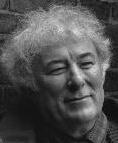 Winner of the Nobel Prize in 1995, Seamus Heaney is an Irish poet of enormous
range. His poetry takes up difficult themes: Heaney penetrates
to the heart what it is to live in the later twentieth century. But
he does so in a voice which is always lyrical and always --surprisingly
-- accessible. Having grown up in Northern Ireland, Heaney does not
shirk the difficult questions of living in a world which is shaped by both
violence and beauty, by the presentness of the past and the possibilities
we can shape our own future. His poetry often meditates on the relation
between the political and the personal, on the difficult intersection where
history and individual consciousness meet. The rare combination of
music and historical interrogation work together to make Heaney, in my
view, the finest poet writing in English today. To
explore the poetry of Seamus Heaney, click on this photograph of him.
Winner of the Nobel Prize in 1995, Seamus Heaney is an Irish poet of enormous
range. His poetry takes up difficult themes: Heaney penetrates
to the heart what it is to live in the later twentieth century. But
he does so in a voice which is always lyrical and always --surprisingly
-- accessible. Having grown up in Northern Ireland, Heaney does not
shirk the difficult questions of living in a world which is shaped by both
violence and beauty, by the presentness of the past and the possibilities
we can shape our own future. His poetry often meditates on the relation
between the political and the personal, on the difficult intersection where
history and individual consciousness meet. The rare combination of
music and historical interrogation work together to make Heaney, in my
view, the finest poet writing in English today. To
explore the poetry of Seamus Heaney, click on this photograph of him.
Zbigniew
Herbert
 Zbigniew Herbert was, along with Nobel Prize winners Czeslaw Milosz and
Wanda Symborska, one of the leading Polish poets of the second half of
the twentieth century. He confronted the violence and anxiety of
the modern world with an extraordinary combination of classical reference
and ironic gaze: yet his poetry is immensely accessible. In a modern
and post-modern world which seems confusing to many, Herbert stands out:
his honesty and clarity are perhaps unparalleled among poets. He
would be my choice as the most under-appreciated poet of our times.
To read Herbert is to encounter a voice that is unforgettable: it is like
visiting a whole new continent! To explore
the poetry of Zbigniew Herbert, click on this photograph of him.
Zbigniew Herbert was, along with Nobel Prize winners Czeslaw Milosz and
Wanda Symborska, one of the leading Polish poets of the second half of
the twentieth century. He confronted the violence and anxiety of
the modern world with an extraordinary combination of classical reference
and ironic gaze: yet his poetry is immensely accessible. In a modern
and post-modern world which seems confusing to many, Herbert stands out:
his honesty and clarity are perhaps unparalleled among poets. He
would be my choice as the most under-appreciated poet of our times.
To read Herbert is to encounter a voice that is unforgettable: it is like
visiting a whole new continent! To explore
the poetry of Zbigniew Herbert, click on this photograph of him.
Vladimir
Myakovsky
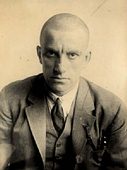 Mayakovsky
began writing poetry in one of the most tumultuous eras in modern history,
the second decade of the twentieth century in Russia. When the revolutionary
upheaval overthrew the Czar and established the U.S.S.R., Mayakovsky was
among the strongest supporters of the Bolsheviks. A propagandist
and visual artist, he was also one of the most radical and influential
of modern poets. A new society seemed to demand a new voice, a new
language, a new role for the poet: and Mayakovsky answered this demand.
His poetry pushes at the borders of what was possible, and often transgresses
those borders. Emotional, theatrical, sometimes rhetorical, Mayakovsky
creates lyrics which are as likely to be shaped by wit as by anger, to
celebrate life as to argue against its injustices. If there were
to be a paradigm, and icon, of revolutionary poetry in the twentieth century,
Mayakovsky would be it.
To explore the poetry of Vladimir Myakovsky -- revolutionary, humorous,
experimental, and often deeply emotional -- click on this photograph of
him.
Mayakovsky
began writing poetry in one of the most tumultuous eras in modern history,
the second decade of the twentieth century in Russia. When the revolutionary
upheaval overthrew the Czar and established the U.S.S.R., Mayakovsky was
among the strongest supporters of the Bolsheviks. A propagandist
and visual artist, he was also one of the most radical and influential
of modern poets. A new society seemed to demand a new voice, a new
language, a new role for the poet: and Mayakovsky answered this demand.
His poetry pushes at the borders of what was possible, and often transgresses
those borders. Emotional, theatrical, sometimes rhetorical, Mayakovsky
creates lyrics which are as likely to be shaped by wit as by anger, to
celebrate life as to argue against its injustices. If there were
to be a paradigm, and icon, of revolutionary poetry in the twentieth century,
Mayakovsky would be it.
To explore the poetry of Vladimir Myakovsky -- revolutionary, humorous,
experimental, and often deeply emotional -- click on this photograph of
him.
Rainier
Maria Rilke
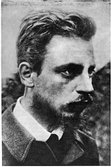 Rainier Maria Rilke lived a life totally dedicated to poetry and the world
of art. His poems investigate the realm of the esthetic. This
subject does not, to some readers (myself among them) by itself seem like
the most fertile ground to explore: life, after all, offers us more than
poetry. And yet to encounter Rilke is to be captivated: by the clarity
and intensity of his willingness to look at the things around him, by his
extraordinary commitment to the world in which he lives -- a world made
manifest in art, and to which every work of art ultimately returns -- and
by the wonderful music of his lines. His astonishing New
Poems of 1907-1908 bring a new intensity of focus to poetry; his later
poems, among them the sonnet series Sonnets to Orpheus and
the monumental series of Duino Elegies, are among the high-water
marks of twentieth-century artistic accomplishment.
To explore the poetry of Rainier Maria Rilke, click on this photograph
of the poet.
Rainier Maria Rilke lived a life totally dedicated to poetry and the world
of art. His poems investigate the realm of the esthetic. This
subject does not, to some readers (myself among them) by itself seem like
the most fertile ground to explore: life, after all, offers us more than
poetry. And yet to encounter Rilke is to be captivated: by the clarity
and intensity of his willingness to look at the things around him, by his
extraordinary commitment to the world in which he lives -- a world made
manifest in art, and to which every work of art ultimately returns -- and
by the wonderful music of his lines. His astonishing New
Poems of 1907-1908 bring a new intensity of focus to poetry; his later
poems, among them the sonnet series Sonnets to Orpheus and
the monumental series of Duino Elegies, are among the high-water
marks of twentieth-century artistic accomplishment.
To explore the poetry of Rainier Maria Rilke, click on this photograph
of the poet.
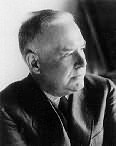 Wallace
Stevens is not, at first glance, the kind of person normally associated
with poetry. A corporate executive -- he was chief counsel for one
of America's largest insurance companies -- he fashioned a poetry that
seems, at first, quite difficult and even obscure. But that is only
at first encounter: Stevens writes lyric poems, and his work is far more
deeply concerned with his emotions than most critics acknowledge.
Poem after poem addresses the joy, or the despair, of everyday life: Stevens
continually records 'what he felt at what he saw.' In addition, few
poets in the entire history of Western literature have been as consumed
by the importance of the imagination, and with the problematic relation
between our minds and the world in which we walk and act, which seems so
clearly to lie outside our individual selves. To
explore the poetry of Wallace Stevens, click on this photograph of him.
Wallace
Stevens is not, at first glance, the kind of person normally associated
with poetry. A corporate executive -- he was chief counsel for one
of America's largest insurance companies -- he fashioned a poetry that
seems, at first, quite difficult and even obscure. But that is only
at first encounter: Stevens writes lyric poems, and his work is far more
deeply concerned with his emotions than most critics acknowledge.
Poem after poem addresses the joy, or the despair, of everyday life: Stevens
continually records 'what he felt at what he saw.' In addition, few
poets in the entire history of Western literature have been as consumed
by the importance of the imagination, and with the problematic relation
between our minds and the world in which we walk and act, which seems so
clearly to lie outside our individual selves. To
explore the poetry of Wallace Stevens, click on this photograph of him.
Poems are essential to human beings. We can't live without them.
We need poems, and the fact that so often we are afraid of them, or consider them not worth our time, is something that leaves us impoverished. After all, the poems don't mind: they're just words on a page. The poets who wrote those words, if they are alive, might mind that not many people read their words -- but the poems themselves, the poems don't care. They are just there, for us to read or to ignore.
To the extent we don't read poems we are denying ourselves something important. Poems can help us get in touch with our selves. Listening to one's self, paying attention to the contours of our daily existence, is harder to do than it seems, and exploring our capacities for feeling and understanding -- well, there is usually no time for that. After all, there is so much to do, and there are so many places to go, and so many demands on our time. Too often we have only scarce opportunities to explore what is really within us, and to experience what surrounds us every waking moment of our lives.
Yet growth, which is so vital to human life: how is it possible to grow if we are not shown new possibilities, possibilities we never even knew were there? How can we try out new ways of seeing and feeling and thinking? Fostering growth: this too is the province of the poem.
In one of those fragments of poetry which many people DO know, John Donne wrote that "no man is an island." He meant we all live connected to one another. But, at the same time, we all actually ARE islands, each occupying a consciousness different from everyone else. How often do we really know what someone else is thinking or feeling? And, to turn it around, don't many of us keep most of what we think and feel deep inside us, away from the scrutiny of others? This too is the province of poetry, for of all human activities it is the most deeply dedicated to revealing, to others, what is inside a fellow human being's heart and mind.
The poets listed below, every one of them, have something to say to you. In some cases what they have to say will be important, maybe so important that it will alter your life or transform your sense of who you are and what you are capable of. But poems are not infallible: sometimes they can seem silly or trite or just plain wrong. We don't have to bow down in reverence to a poem: if we don't like what the poet is saying or how he or she is saying it, there is no reason to hide our own feelings. If a poem doesn't seem to speak to you or me -- and we have made a serious attempt to listen -- then we are surely justified in deciding you have better things to do than read that poem again.
Since poetry is, in my view, primarily an auditory medium -- how the poem
looks on a page is not as important as how it sounds when it is read, or
how it resounds in your mind as you recall pieces of the poem -- the following
pages and programs talk about poems by literally talking about poems.
You'll hear poems read, as if the poet were addressing you directly and
privately; you'll hear poems talked about because poetry depends on voice,
and the human voice is our best means of communicating the deepest truths
about our lives.
To listen to the various programs on the web pages for individual poets, you must use RealAudio. If you do not have it, you can download it, for free, by clicking on the icon below and going to RealNetworks. [Make sure you look hard at the RealNetworks site to find the free download -- it works as well as the version they charge you money for.]